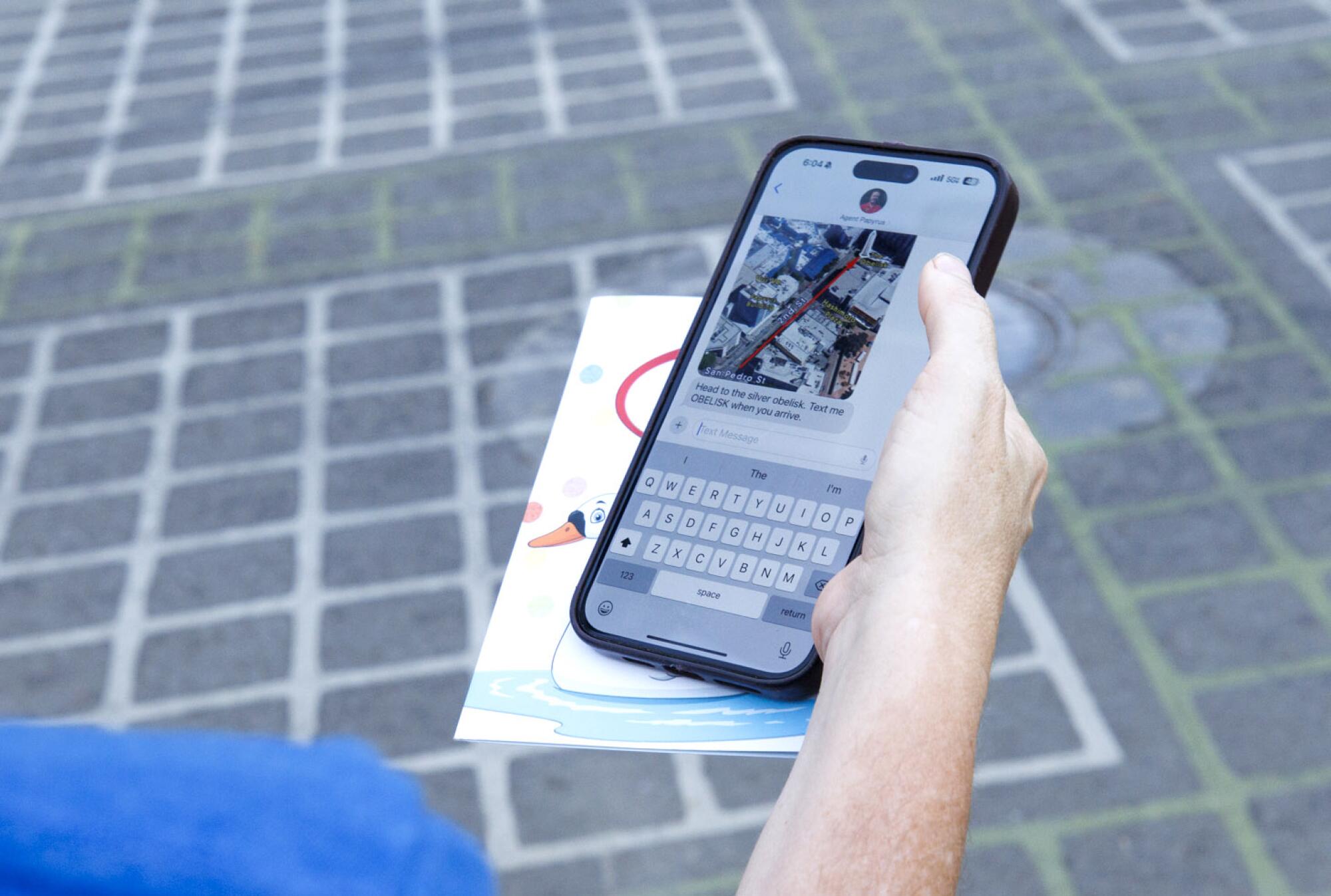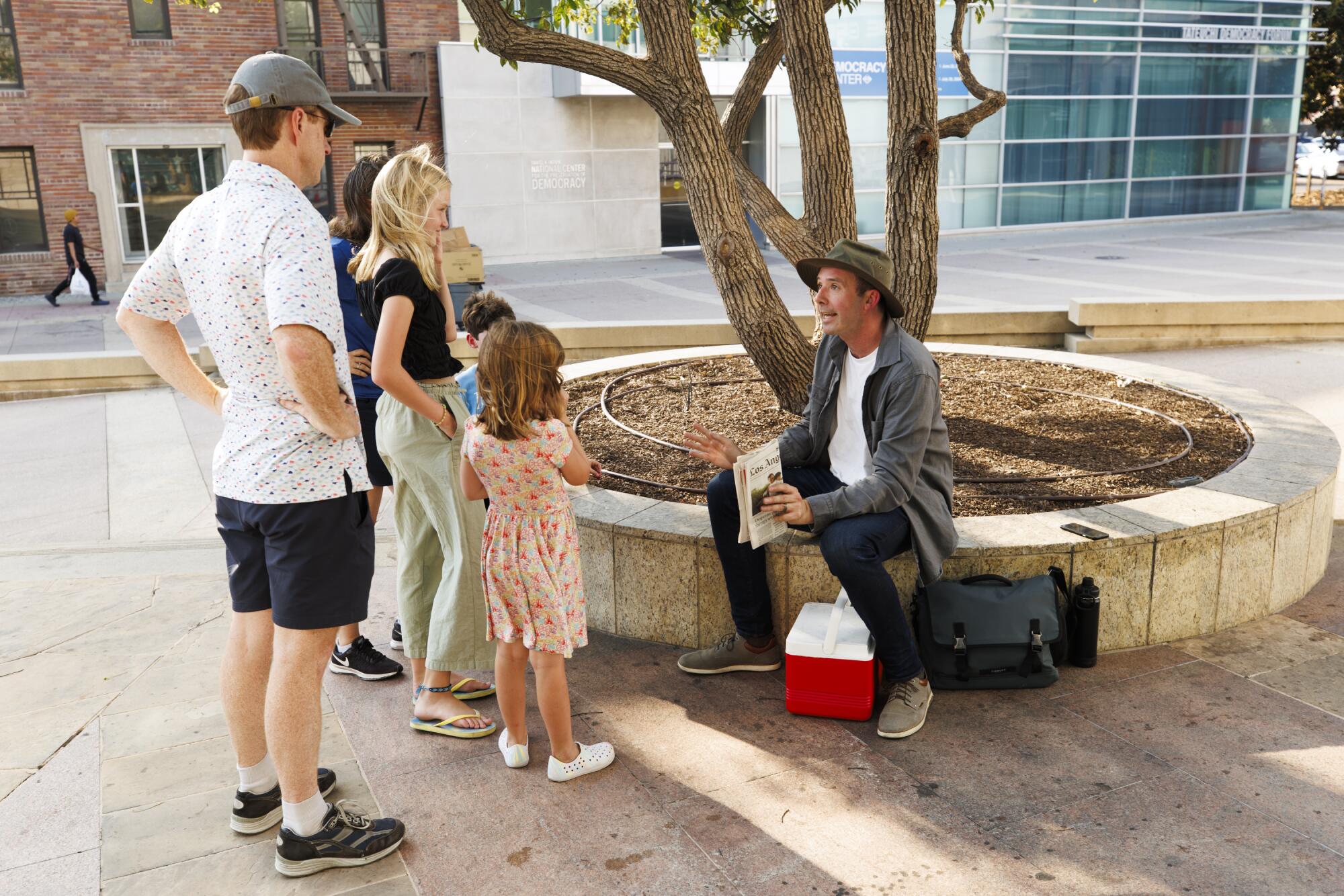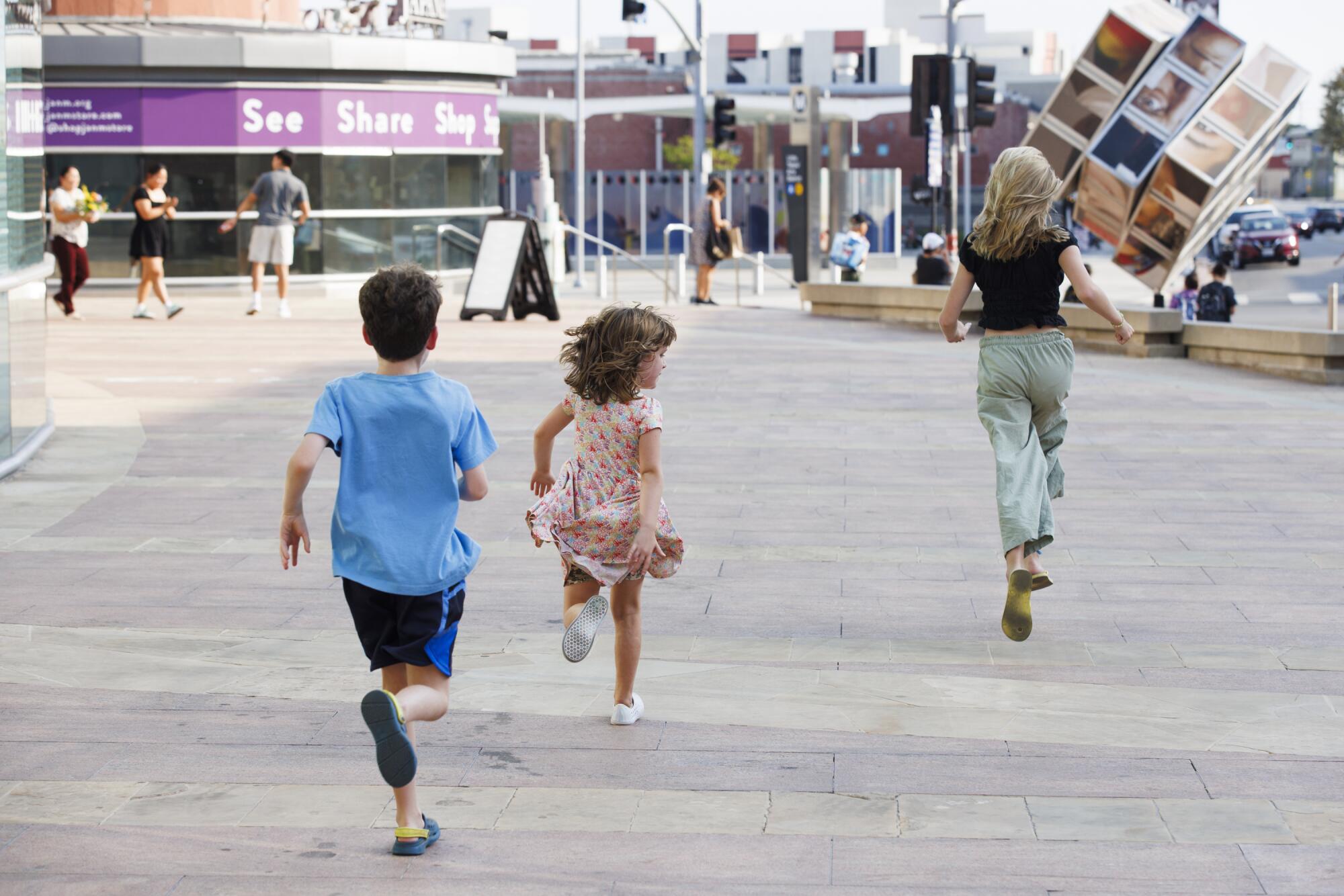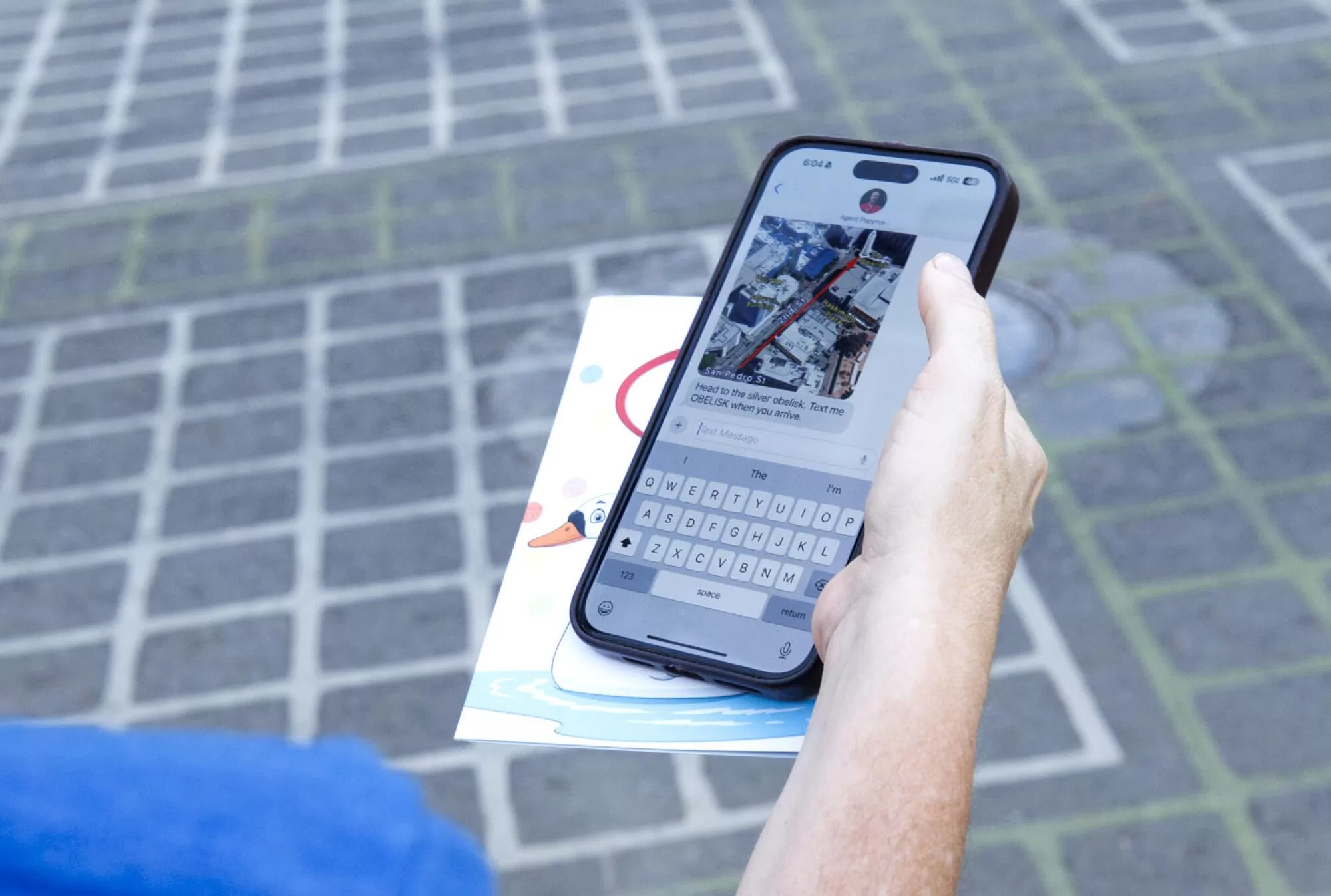The conceit: Players are tasked with tracking down a rogue spy. But perhaps they’re the ones being tracked.
I’m standing in a Little Tokyo courtyard, and I receive a text message from a stranger. I’m being watched, they tell me. And then they offer an observation, specifically that I’m “acting a little weird.”
I look around, surveying the behavior of everyone around me on a busy Sunday afternoon. Diners waiting for a seat at a revolving sushi restaurant, shoppers in line for Hello Kitty merch, a couple enjoying a pastry on the foot of a stage, a young man drawing the scene at a nearby table — who, if any, has their eye on me. “Relax your posture,” a text tells me, and I lean against a railing to fiddle with my phone.
A spy has gone rogue. And I’m tracking them, trying to retrace their steps. Or perhaps they’re tracking me. The texts I’m receiving, I’m told, are coming from a nearby office building, and I look up, but then quickly avert my eyes. I don’t want to give away the location of the agency helping me.

Molly Moran holds a phone with directions on how to play “Spies Among Us,” a text-driven interactive mystery game.
(Carlin Stiehl / For The Times)
This is “Spies Among Us,” a text-driven game with live actors that takes place on the streets of Little Tokyo. Think of it as a scavenger hunt for a person on the move with light, escape room-inspired puzzles. It transforms the neighborhood into a stage, directing me around multiple locales in and around Japanese Village Plaza and the nearby Frances K. Hashimoto Plaza — a restaurant, a market, historic monuments — to become hyper-aware of my surroundings. Told to move under a canopy of lanterns, I’m warned that any of those around me could be a participant, and I try to blend in, browsing for a place to eat. Living near Little Tokyo, I’m in the area often, but never has it felt so active — every location, sidewalk and stoop is potentially part of the story.
Walking somewhere among these city blocks is my target. I receive texts telling me when and where they used a credit card, each a clue as to what they may be wearing or carrying. I’m playing solo, viewing each passerby with suspicion. At some point I know that I am going to have to confront a stranger, and ask if they are indeed a spy, and I’m frantically creating a profile based on the clues I receive via text.
“Some people really believe the spy is a woman. Some really believe it’s a man,” says “Spies Among Us” creator Prescott Gadd, 40. “But once that gets in your head, you’re gone. You’re in trouble. I try to make the show a little easier for solo players, because if you don’t have someone to bounce your thoughts off of, you can go down rabbit holes.”

Prescott Gadd, the creator of and an actor in “Spies Among Us,” explains the game to the Moran family.
(Carlin Stiehl / For The Times)
I fell in some.
At one point in the game I was receiving multiple texts in rapid succession, my location compromised and a potentially villainous agency about to pounce on me. Something, I was told, was tracking me, and I scoured an area of Weller Court looking for a hidden object. I brushed aside plants, likely spooked a couple having coffee and frantically searched for what could be giving away my locale. No spoilers, but the solution was far more mundane and simple than I had imagined.
“I think everyone likes light puzzling, if not heavy puzzling,” says Gadd, a designer of scavenger hunts and orchestrator of interactive events. “I was definitely trying to go for simple approachable puzzles, and with puzzle design, you always need to make it easier than you think.”
“Spies Among Us” has been running since April and the intention is to keep it going indefinitely on weekends in Little Toyko. Gadd acts in the show, a top hat-sporting representative of a spy agency, always seen carrying a copy of The Times.

From left: Mark Moran and his children Jack Moran, 9, Grace Moran, 12, and Sally Moran, 6, study a clue while playing “Spies Among Us” in Little Tokyo.
(Carlin Stiehl / For The Times)
The story is light. We interact with multiple fictional spies via text, and as the narrative spins out we start to learn that the firm we’re supposedly working for may not be the so-called good guys. Still, the tale doesn’t go deep into high-stakes political espionage. As Gadd points out, the sophisticated tension of author John le Carré this is not.
“In no way are we honoring that tradition at all,” Gadd says. “This truly was all experience-driven. I wanted you to find an actor by solving clues in a public space. What’s the most approachable theme for that? It’s obviously an undercover spy thing.”
Gadd, a Los Angeles native, has a background in theater, and in the past has helped run a dinner theater franchise. The original vision for “Spies Among Us” was to create a long-running, relatively affordable immersive theater experience, as many endeavors in the space tend to be the exact opposite — short-lived and high-priced. Gadd envisioned a mall setting, but the cost of running a show in a shopping center was too prohibitive, especially considering “Spies Among Us,” which should take about 90 minutes to complete, has a buy-in of $27.45 per person.

“Spies Among Us” player Marcelina Kalet receives a final text from an informant on her way to solving the mystery and finding the rogue spy.
(Carlin Stiehl / For The Times)
“I wanted something pedestrian-friendly and safe — a place people would be willing to go to,” Gadd says. “Little Tokyo was by far the No. 1 spot when I thought about places I liked to walk around. And there’s a density that makes it feel like you’re not in Los Angeles. It’s reminiscent of New York or Chicago.”
Still, the game took about two years to build, much of that time spent honing the automated text messages players will receive, which are tailored to respond to certain key words. The majority of the puzzles unfold via the app. We may, for instance, receive a text that tells us what the spy is wearing, but it will need to be unscrambled.

Marcelina Kalet holds a card she received after solving the mystery in “Spies Among Us.”
(Carlin Stiehl / For The Times)
As someone who is relatively shy, by far the most anxiety-inducing part of the game was confronting the person I thought was the spy. We’re given a friendly sentence to address them with, and even though my suspicions proved correct, I still followed the person for a number of blocks before working up the nerve to confront them. This felt both a little odd and yet slightly thrilling. I was, in essence, stalking a stranger for a few minutes, but I was also briefly getting to live out some spy-focused dreams.
“I really wanted to make sure what you said to the spy never would feel rude if you did get the wrong person,” Gadd says. “To my knowledge, no one has gotten the wrong person yet.”
That’s a testament to the success of “Spies Among Us.” Though there are puzzles, this isn’t akin to an escape room with a fail state. Think of it more as a work of theater that unfolds throughout Little Tokyo, a game that allows us to become the protagonist, and every stranger an unwitting extra.
And though its goal is to find a hidden spy, its greatest achievement is a reminder that the world is full of unseen narratives.

The Moran children race between locations while playing “Spies Among Us” in Little Tokyo.
(Carlin Stiehl / For The Times)
